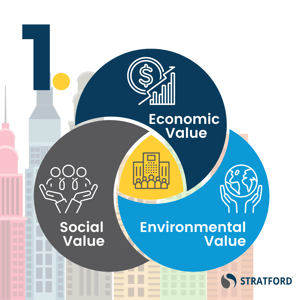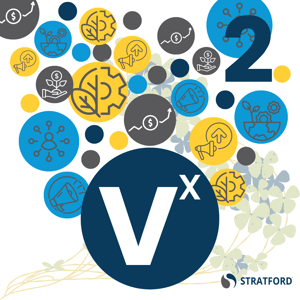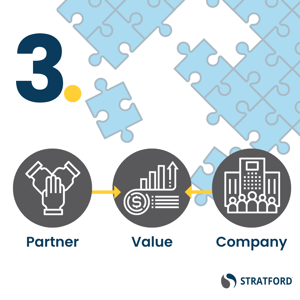In our recently published “Global Trends to Consider in 2023,” we identified six key themes impacting organizations. Among them were Sustainability/ESG, Accelerated digital transformation, Augmented customer experience and Supply chain challenges. Collaboration is a common factor that allows organizations to take full advantage of these trends’ opportunities.
Business schools have been teaching us for years that for an organization to be successful, it must beat the competition. Since the early days of strategic thinking in business, the frameworks and approaches developed were about finding ways to defeat the competition in a zero-sum game. In simple terms, the main idea of winning (that someone must lose) in a competitive environment was to differentiate the organization from the competition by offering a product or service of superior characteristics or by being the cost leader.
These ideas worked very well in predictable environments, where robust value chains did not leave space for other entrants, with asymmetry of information between companies and their clients and where environmental and social topics were separate from the business agenda.
The ways in which we are engaging with customers, businesses and competitors is changing…
Nowadays, the business environment is very different from what is described above. We see frequent and profound changes; technology advancements provide customers with unprecedented access to information (shifting the power from the companies to the customers) and allow competitors to disintermediate value chains.
A key implication of these changes is that the strategic principles that made companies successful in the industrial era are strongly challenged. One of the biggest lessons that we learned is that beating the competition is no longer the only way to succeed; collaboration instead of competition is emerging as the key to success in the new business environment.
There are three primary drivers for this change of focus:

|
Companies must provide value that goes beyond shareholders In the last few years, we have witnessed a fundamental shift in who the recipients of the benefits created by organizations are. The idea that companies exist to create value only for their shareholders is rapidly becoming out of touch with modern reality. If, in the past, companies were able to be successful despite negative impacts on the environment or society, that is no longer the case. Environmental and social considerations are becoming a priority in the organizations’ strategy, operations, and the investors’ community. |
|
Value is amplified with an ecosystem approach to business. Companies have started to realize that they are part of a larger ecosystem that goes beyond the company’s value chain and even their industry boundaries. Other actors in its ecosystem, including the environment and societies, must also succeed for a company to thrive. It is no longer about beating the competition as much as finding ways to collaborate in a larger ecosystem to generate more value for the company’s clients, the environment, the society and, of course, the shareholders. As mounting evidence shows, by creating benefits for all the actors in the ecosystem, the value is amplified orders of magnitude compared to what the company could achieve on its own from the economic, environmental, and social perspectives. |
 |

|
Individual companies can only provide some of the value their customers and stakeholders expect. Another critical driver for collaboration is that a single company can only provide some of the value its stakeholders need. As a result, it is increasingly common to see companies that partner with other organizations to meet the customers’ changing and increasingly sophisticated expectations that go beyond the specific product or service to encompass other factors such as experience and alignment with personal values. |
Stop, collaborate, and listen
We have seen a number of success stories of collaboration during the pandemic. To mention one notable example, let’s consider the partnership between Pfizer Inc. and BioNTech to develop and commercialize the vaccine against COVID-19 that led to the production of millions of doses in record time and provided enormous benefits for societies around the globe and for the companies as well.
There are many more examples of thriving ecosystems that leverage technological advancements, like Uber, Airbnb, and Amazon and success stories of collaboration between competitors like Apple and Samsung, DHL and UPS, Ford and GM, and Google and Yahoo. Currently, four of the five most important companies in the world by market capitalization are ecosystem players (Amazon, Microsoft, Alphabet, and Apple).
This new way of looking at value creation and the competition requires organizations to fundamentally change and develop new capabilities traditionally not present in companies accustomed to the “beat the competition” mentality (successful business leaders of the past were hardwired to beat the competition).
It entails, for instance, replacing strategic questions such as “what business are you in?” with “what solutions to problems does your company provide?”. It requires abandoning a product/service-centric mentality to formulate and execute strategies that include exploration and exploitation of opportunities. It also necessitates developing new capabilities to work with stakeholders not typically part of the company value chain, such as regulators, NGOs, other companies, and even competitors, as seen in the above examples.
In the digital age and in a business environment with pressing social and environmental challenges that must be addressed, collaboration is rapidly becoming essential to the organizations’ success. Where is your company in the collaboration journey? Do you have what it takes to succeed?
At Stratford, we have a multidisciplinary team of senior professionals with the experience and knowledge to help you succeed. Contact us. We’ll be happy to help you develop and implement winning strategies using state-of-the-art methodologies tailored to your specific needs.
If you’d like to learn more, please reach out to info@stratford.group.
About Carlos:
Carlos Duran is a senior professional with over twenty-five years of experience in strategy formulation and execution. He helps organizations globally to design and implement strategies and business transformation initiatives across various industry sectors. His areas of expertise include digital transformation and the integration of ESG considerations into core business strategies. Carlos also possesses in-depth experience in business process improvement, quality management systems, project management and business performance management. He holds an MBA from Newcastle University in the UK, a Master’s in Quality Management and Process Improvement from Cologne University of Applied Sciences, Germany, a Civil Engineering degree from UNT, Argentina, and a specialization in Digital Strategy from MIT, USA. As Senior Advisor at Stratford, Carlos helps organizations create and sustain long-lasting value.

